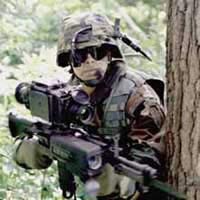Instead of holding and looking at a compass and handheld audio devices for navigation, special operations divers can process information through their own tongues, allowing their hands and eyes to remain completely free.
 |
|
Future super soldier. |
Military scientists are set to use the human tongue as a primary tool in the concept of a super soldier. This individual will possess all the best abilities seen in representatives of the animal kingdom. According to Director Ken Ford of the Florida Institute for Human and Machine Cognition (FIHMC), his institute specializes in equipping people with modern technology to make machines more user-friendly.
Researchers at FIHMC are conducting a study that allows special operations soldiers to have a 360-degree night vision capability, while also providing Navy SEAL teams with sound awareness in their minds—while still being capable of normal underwater observation. Thus, it can be said that if soldiers have these abilities, science fiction will become reality.
The aforementioned device, known as the Brain Port, was first researched 30 years ago by Dr. Paul Bach-y-Rita, a neuroscientist at the University of Wisconsin. Bach-y-Rita began observing images from a camera attached to electrodes placed on the back of test subjects. He later discovered that the tongue was an extraordinary signal transmitter.
In a recent study, scientists used a narrow red plastic strip to connect the Brain Port to the tongue, where 144 microelectrodes transmit information through nerve fibers to the brain. According to Dr. Anil Raj, the lead scientist on this project, instead of holding and looking at a compass and handheld audio devices for navigation, special operations divers can process information through their own tongues, thus leaving their hands and eyes completely unencumbered.
During testing, the research team demonstrated that blind individuals could find exits, recognize people walking in front of them, and even catch a ball. According to AP, a version of this device, expected to be released soon, may also help restore balance for those with vestibular nerve damage caused by improper use of antibiotics.
The U.S. Department of Defense’s Advanced Research Projects Agency has funded this program. Michael Zinszer, a former Navy SEAL and now Director of the Underwater Crime Scene Investigation School at the University of Florida, also participated in the tongue signal transmission tests at a swimming pool. He found the sensation on his tongue reminiscent of chewing Pop Rocks candy.
Future underwater crime scene investigators may use this device to identify search samples, communicate with one another, and “see” through their tongues—though it may sound unbelievable, according to Zinszer’s metaphorical description. Anil Raj believes that the ultimate goal for the military is to ensure that the hands and eyes of Navy divers are completely free to observe whether anything is surfacing from the mud and to act in an instant. Sound is just the next step.
Raj and his team spent many hours testing this device in an indoor pool at the University of West Florida’s athletic complex. They plan to officially demonstrate this system to Navy and Marine Corps divers in May 2006. If successful, the new device system will be manufactured and ready for use within the next six months. Raj happily commented: “Using their own head and tongue, every soldier will have the ability to operate through the night without the need for infrared binoculars.”
Minh Nhựt


















































